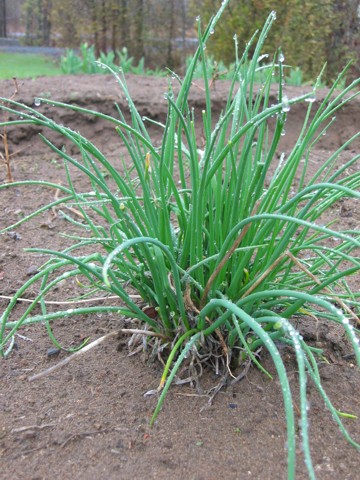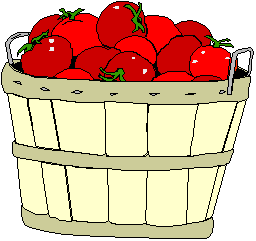Owing to the screen size of your device, you may obtain a better viewing experience by
rotating your device a quarter-turn (to get the so-called "panorama" screen view).
|
This page updated for 2022.
|
Click here for the site directory.
|
|
Please consider linking to this site!
|
Click here to email us.
|
Chives
(Allium schoenoprasum)
About Chives

Chives, a perennial grassy looking green with a mild onion-like flavor, are a kitchen essential, providing that onion-like flavor where the assertiveness of onion itself would not fit. They are one of the classic fine herbes.
Cultivars
Believe it or not, there are now numerous hybrid varieties of chives—where does the madness end?
There are several named open-pollinated chive cultivars—we found seven, and there may be more—though most seed catalogues act as if they were unveiling The Secrets Of Isis just to distinguish between ordinary chives and garlic chives (which is a distinct species, A. tuberosum, not a cultivar of ordinary chives).
The variety Grolau (aka “Windowsill Chives”), was developed especially for indoor growing, and that one is our choice (seed is reasonably available).
Planting
Chives sprout easily from seed, after which they can easily be propagated vegetatively by clump division—or you can cut the cackle and just buy a plant (they are perennials). They are said to prefer a sunny position in a rich, moist, but well-drained soil, but are also said to be quite forgiving of adverse conditions.
Growing
Chives generally like moist (but not soggy) soil.
Chives tolerate heavy harvesting, and regular cutting of the leaves not only insures a continuous supply of young leaves, it prevents the plants from flowering. (If they do flower, pinch off the buds, which are quite edible.) Harvest by cutting some, or even all, of the leaves—but be sure to cut close to the soil level, so the plant “knows” to send up new leaves.
A little balanced organic fertilizer every season would not go amiss.
It is considered wise to re-divide one’s chives every few years, to maintain plant vigor. Division can be done almost anytime, but is probably best done in spring.
Relevant Links
Besides any links presented above on this page, the following ought to be especially helpful.
Return to the top of this page.
If you find this site interesting or useful, please link to it on your site by cutting and pasting this HTML:
The <a href="https://growingtaste.com/"><b>Growing Taste</b></a> Vegetable-Gardening Site
—Site Directory—
Search this site, or the web
-
Background Information
about the purposes and design of this site
- Site Front Page
-
Introduction

- An Apologia: why one should cultivate one's garden
- Deep-Bed Gardening (forthcoming)
- Container Gardening (forthcoming)
- Vegetarian and Organic Considerations (forthcoming)
-
Recommended Crops for a home garden, by variety
-
Gardening information and aids
-
Miscellaneous Information of interest to the home gardener
Since you're growing your own vegetables and fruits, shouldn't you be cooking them in the best way possible?
Visit The Induction Site to find out what that best way is!
|
If you like good-tasting food, perhaps you are interested in good-tasting wines as well?
Visit That Useful Wine Site for advice and recommendations for both novices and experts.
|

|
This site is one of The Owlcroft Company family of web sites. Please click on the link (or the owl)
to see a menu of our other diverse user-friendly, helpful sites.
|
|
 Like all our sites, this one is hosted at the highly regarded Pair Networks,
whom we strongly recommend. We invite you to click on the Pair link for more information on getting your site or sites hosted on a first-class service.
Like all our sites, this one is hosted at the highly regarded Pair Networks,
whom we strongly recommend. We invite you to click on the Pair link for more information on getting your site or sites hosted on a first-class service.
|
|
All Owlcroft systems run on Ubuntu Linux and we heartily recommend it to everyone—click on the link for more information.
|
Click here to send us email.
Because we believe in inter-operability, we have taken the trouble to assure that
this web page is 100% compliant with the World Wide Web Consortium's
XHTML Protocol v1.0 (Transitional).
You can click on the logo below to test this page!
You loaded this page on
Friday, 18 April 2025, at 22:00 EDT.
It was last modified on Sunday, 9 January 2022, at 18:42 EST.
All content copyright ©1999 - 2025 by
The Owlcroft Company

